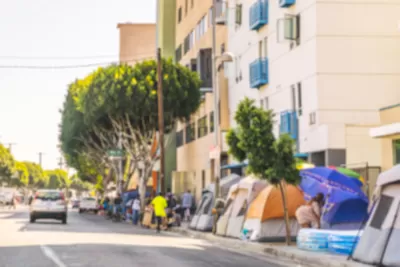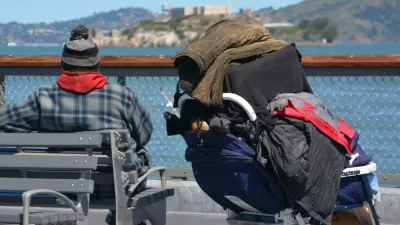California's effort to create emergency supportive housing options during the pandemic has completed a large-scale acquisition process.

"Governor Gavin Newsom today announced that all 94 Homekey projects have closed escrow, buildings that will provide 6,029 critically needed housing units for people experiencing homelessness throughout California," according to a press release from Gov. Newsom's office.
The state used total of $750 million in federal Coronavirus Relief Fund dollars to help finance 51 applicants for the 94 projects. "In addition, $96 million in operating supports – a combination of state funds and philanthropic investment – has also been fully awarded. In total, Homekey utilized $846 million to rapidly purchase and subsidize these 6,029 units in less than six months from start to finish," according to the press release.
"The purpose of these acquisitions is to create permanent places for at-risk individuals experiencing homelessness to live safely, protecting them from many public health risks including the impacts of the COVID-19 pandemic."
Several media outlets, local and national, have been tracking Project Homekey in recent months. Here's a sample of recent news coverage about the ongoing effort to protect the state of California's large population of unhoused residents during the pandemic.
- LA City Council continues to convert hotels into interim housing thanks to Project Homekey (Archinect, December 15, 2020)
- Can Gov. Gavin Newsom use the pandemic to beat back homelessness? (ABC 10, November 30, 2020)
- Project Homekey changes lives for the better (OC Register, November 28, 2020)
- Project Homekey proceeds over local objections (Los Angeles Daily News, October 22, 2020)
- California’s Project Homekey Turns Hotels into Housing (Next City, September 29, 2020)
FULL STORY: Governor Newsom Announces Major Homekey Milestone: All 94 Sites Closing Escrow Ahead of Deadline

Alabama: Trump Terminates Settlements for Black Communities Harmed By Raw Sewage
Trump deemed the landmark civil rights agreement “illegal DEI and environmental justice policy.”

Planetizen Federal Action Tracker
A weekly monitor of how Trump’s orders and actions are impacting planners and planning in America.

The 120 Year Old Tiny Home Villages That Sheltered San Francisco’s Earthquake Refugees
More than a century ago, San Francisco mobilized to house thousands of residents displaced by the 1906 earthquake. Could their strategy offer a model for the present?

In Both Crashes and Crime, Public Transportation is Far Safer than Driving
Contrary to popular assumptions, public transportation has far lower crash and crime rates than automobile travel. For safer communities, improve and encourage transit travel.

Report: Zoning Reforms Should Complement Nashville’s Ambitious Transit Plan
Without reform, restrictive zoning codes will limit the impact of the city’s planned transit expansion and could exclude some of the residents who depend on transit the most.

Judge Orders Release of Frozen IRA, IIJA Funding
The decision is a victory for environmental groups who charged that freezing funds for critical infrastructure and disaster response programs caused “real and irreparable harm” to communities.
Urban Design for Planners 1: Software Tools
This six-course series explores essential urban design concepts using open source software and equips planners with the tools they need to participate fully in the urban design process.
Planning for Universal Design
Learn the tools for implementing Universal Design in planning regulations.
Clanton & Associates, Inc.
Jessamine County Fiscal Court
Institute for Housing and Urban Development Studies (IHS)
City of Grandview
Harvard GSD Executive Education
Toledo-Lucas County Plan Commissions
Salt Lake City
NYU Wagner Graduate School of Public Service





























